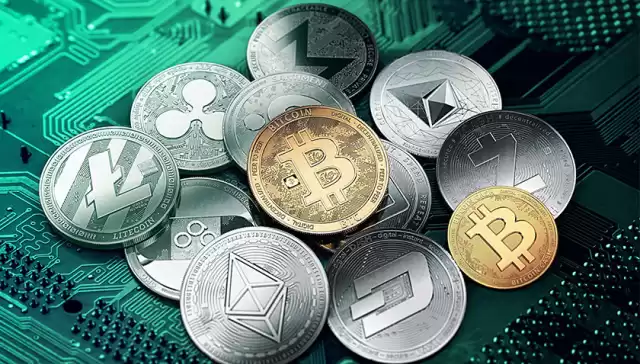-
 bitcoin
bitcoin $87959.907984 USD
1.34% -
 ethereum
ethereum $2920.497338 USD
3.04% -
 tether
tether $0.999775 USD
0.00% -
 xrp
xrp $2.237324 USD
8.12% -
 bnb
bnb $860.243768 USD
0.90% -
 solana
solana $138.089498 USD
5.43% -
 usd-coin
usd-coin $0.999807 USD
0.01% -
 tron
tron $0.272801 USD
-1.53% -
 dogecoin
dogecoin $0.150904 USD
2.96% -
 cardano
cardano $0.421635 USD
1.97% -
 hyperliquid
hyperliquid $32.152445 USD
2.23% -
 bitcoin-cash
bitcoin-cash $533.301069 USD
-1.94% -
 chainlink
chainlink $12.953417 USD
2.68% -
 unus-sed-leo
unus-sed-leo $9.535951 USD
0.73% -
 zcash
zcash $521.483386 USD
-2.87%
What Is an API?
An API (Application Programming Interface) defines how software components communicate, enabling data sharing and functionality integration between applications.
Oct 17, 2024 at 03:42 pm

- Definition
An API, or Application Programming Interface, is a set of functions, protocols, and definitions that define how different software components interact. It provides a way for two applications to talk to each other, sharing data and functionality.
- Components
An API typically consists of the following components:
Web Service: The interface used for communication between applications.
Requests: The messages sent by one application to the other.
Responses: The messages returned by the receiving application.
Definition: A specification describing the structure and semantics of the API.
- Types of APIs
There are various types of APIs, including:
Web APIs: Use HTTP protocols to communicate over the internet.
SOAP APIs: Use the Simple Object Access Protocol (SOAP) for XML-based communication.
REST APIs: Use representational state transfer (REST) principles for communication.
RPC APIs: Use remote procedure calls to execute functionality on a remote system.
Database APIs: Provide access to database systems for CRUD (Create, Read, Update, Delete) operations.
- Benefits of Using APIs
APIs offer several benefits:
Increased Reusability: Allows applications to share common functionality, reducing code duplication.
Improved Interoperability: Enables easy integration of different software systems.
Faster Development: Provides pre-built components and functionality, accelerating development time.
Enhanced Extensibility: Allows for the addition of new features and functionality without major changes to the base application.
- Examples
Examples of popular APIs include:
Twitter API: Accesses the Twitter social media platform.
Google Maps API: Provides mapping and location services.
PayPal API: Facilitates online payments.
Amazon Web Services (AWS) API: Offers a wide range of cloud computing services.
Disclaimer:info@kdj.com
The information provided is not trading advice. kdj.com does not assume any responsibility for any investments made based on the information provided in this article. Cryptocurrencies are highly volatile and it is highly recommended that you invest with caution after thorough research!
If you believe that the content used on this website infringes your copyright, please contact us immediately (info@kdj.com) and we will delete it promptly.
- Arthur Hayes Dissects Bitcoin Selloff: It's All About Dollar Liquidity and IBIT's Hedging Hustle
- 2026-02-07 19:25:02
- Trump's Crypto Rollercoaster: Bitcoin's Wild Ride and Industry Woes
- 2026-02-07 19:10:01
- Vitalik Buterin's Patient Pursuit: Ethereum's Co-Founder Backs Privacy, Signaling a Long Wait for Foundational Crypto Strength
- 2026-02-07 19:10:01
- Bitcoin's Generational Opportunity: Navigating FOMO Amidst Institutional Waves
- 2026-02-07 19:05:01
- Ethereum Navigates Liquidity Trap Amidst Hype for a Mega Run
- 2026-02-07 19:00:02
- Polymarket Gears Up for Crypto Token Launch: "POLY" Trademark Filings Signal Imminent Debut
- 2026-02-07 18:55:01
Related knowledge

What is the future of cryptocurrency and blockchain technology?
Jan 11,2026 at 09:19pm
Decentralized Finance Evolution1. DeFi protocols have expanded beyond simple lending and borrowing to include structured products, insurance mechanism...

Who is Satoshi Nakamoto? (The Creator of Bitcoin)
Jan 12,2026 at 07:00am
Origins of the Pseudonym1. Satoshi Nakamoto is the name used by the individual or group who developed Bitcoin, authored its original white paper, and ...

What is a crypto airdrop and how to get one?
Jan 22,2026 at 02:39pm
Understanding Crypto Airdrops1. A crypto airdrop is a distribution of free tokens or coins to multiple wallet addresses, typically initiated by blockc...

What is impermanent loss in DeFi and how to avoid it?
Jan 13,2026 at 11:59am
Understanding Impermanent Loss1. Impermanent loss occurs when the value of tokens deposited into an automated market maker (AMM) liquidity pool diverg...

How to bridge crypto assets between different blockchains?
Jan 14,2026 at 06:19pm
Cross-Chain Bridge Mechanisms1. Atomic swaps enable direct peer-to-peer exchange of assets across two blockchains without intermediaries, relying on h...

What is a whitepaper and how to read one?
Jan 12,2026 at 07:19am
Understanding the Whitepaper Structure1. A whitepaper in the cryptocurrency space functions as a foundational technical and conceptual document outlin...

What is the future of cryptocurrency and blockchain technology?
Jan 11,2026 at 09:19pm
Decentralized Finance Evolution1. DeFi protocols have expanded beyond simple lending and borrowing to include structured products, insurance mechanism...

Who is Satoshi Nakamoto? (The Creator of Bitcoin)
Jan 12,2026 at 07:00am
Origins of the Pseudonym1. Satoshi Nakamoto is the name used by the individual or group who developed Bitcoin, authored its original white paper, and ...

What is a crypto airdrop and how to get one?
Jan 22,2026 at 02:39pm
Understanding Crypto Airdrops1. A crypto airdrop is a distribution of free tokens or coins to multiple wallet addresses, typically initiated by blockc...

What is impermanent loss in DeFi and how to avoid it?
Jan 13,2026 at 11:59am
Understanding Impermanent Loss1. Impermanent loss occurs when the value of tokens deposited into an automated market maker (AMM) liquidity pool diverg...

How to bridge crypto assets between different blockchains?
Jan 14,2026 at 06:19pm
Cross-Chain Bridge Mechanisms1. Atomic swaps enable direct peer-to-peer exchange of assets across two blockchains without intermediaries, relying on h...

What is a whitepaper and how to read one?
Jan 12,2026 at 07:19am
Understanding the Whitepaper Structure1. A whitepaper in the cryptocurrency space functions as a foundational technical and conceptual document outlin...
See all articles










































































